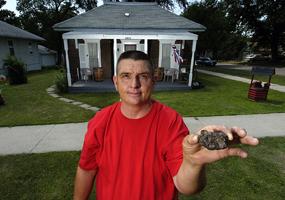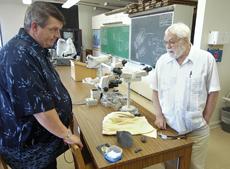[meteorite-list] Nebraska Man Says He Was Nearly Hit By Meteorite
Ron Baalke baalke at zagami.jpl.nasa.gov
Thu Jun 30 20:04:40 EDT 2005
http://www.theomahachannel.com/news/4672177/detail.html
Fairbury Man Says He Was Nearly Hit By Meteorite
NU Professors Examining Rock
The Omaha Channel (Nebraska)
June 30, 2005
FAIRBURY, Neb. -- A Fairbury man was watering his yard last week when he
had a very rare and close encounter with a possible meteorite.
Brad Kinzie was out watering his yard in the wee hours of the morning
Saturday -- trying to avoid the hottest period of the day -- when an
object whizzed by his head and landed.
"It came over my head, probably, about a foot and a half. I could feel
the breeze," Kinzie said. "It was silver and it kind of had red and
black on the back of it and smoke."
The object landed about 65 feet from where Kinzie was watering.
"I stood ... here looking at it, 'cause it was still glowing. I says,
'Wow,'" Kinzie said.
Kinzie left it there to cool off, and made two wishes on his falling star.
"One of my wishes came true. My oldest brother wasn't speaking to my
sister for two years. They got back together," he said.
Kinzie is checking with University of Nebraska astronomy professors to
see if it is a real meteorite. If it is, Kinzie is in very rare company.
The chances of this close of an encounter are one in 100 billion, expert
said..
"I just been busy, people calling me on the phone," Kinzie said.
Kinzie wouldn't say what his second wish is. After all, he said, it
hasn't come true yet.
"Only once in a 100 billion years, and it will probably never happen to
me again," he said.
Kinzie said if it is a meteorite, he will probably sell it. Collectors
have been known to pay thousands of dollars for rare meteorites.
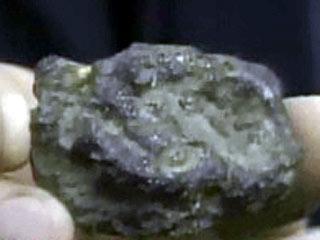
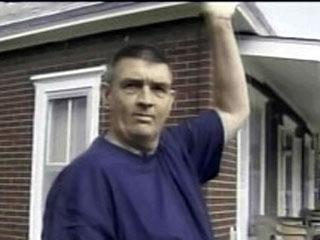
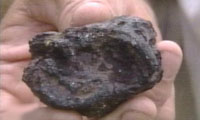
The video.
http://www.journalstar.com/articles/2005/06/30/top_story/extras/doc42c3529782b8d302103789.txt
Sky falls on Fairbury man
By JONNIE TAT'E FINN
Lincoln Journal Star
July 6, 2005
FAIRBURY - Brad Kinzie made a wish on a falling star last week.
Actually, he made two - after a close encounter with what he believes is
a meteorite. "It swooshed right over my head," Kinzie, 50, said
Wednesday at his home in Fairbury. "I shut my eyes when I felt its wind
push past me. I knew right away it was a falling star."
That was at 1:30 a.m. Friday. Kinzie was watering his front lawn.
"It's been so hot," he explained. "The grass gets more water when you do
it at night."
The quarter-pound object, which hasn't yet been analyzed by experts,
fell at about a 45-degree angle from the southwest and landed about 65
feet from Kinzie, he said. He marked off his position with a pinwheel
and planted a fake red flower where the specimen fell.
The rock, with its darkly colored pitted surface, is about 2.5 inches
long and 1.5 inches across.
"It still had a silver and reddish-orange glow to it when I checked it
out," Kinzie said. "So I left it where it was overnight - I wasn't going
to touch it. But I didn't sleep a wink."
That weekend, Kinzie told his two grandchildren about the close encounter.
"Michael said, 'Grandpa, you need to get a hold of those people at the
university,'" Kinzie recalled. "In a little hick town, you don't know
what to do with something like this."
On Monday, Kinzie called Martin Gaskell, an astronomy professor at the
University of Nebraska-Lincoln.
"This is an extremely rare case," Gaskell said. "There are only a
handful of cases of this kind of close encounter. A chance of this
happening to any one individual is maybe one in 10 million or one in 100
million."
Without examining the specimen, Gaskell said it's hard to be 100 percent
sure if what Kinzie found was, in fact, a meteorite.
But there is strong evidence for it, the professor said.
"Well, it was a witnessed fall, though I doubt it was still glowing when
he found it. That was probably more psychological, I think," Gaskell said.
Meteorites stop burning about 10 miles up in the atmosphere but are
still hot when they land.
The object also has a strong magnetic pull and the physical
characteristics of a meteorite. "I imagine it's probably an iron
meteorite," he said.
Sam Treves, professor emeritus at UNL who Gaskell described as an expert
in meteors, will study the object. Treves was unavailable for comment
Wednesday.
In the lab, the rock will be sliced and etched with acid, which - if
it's a meteorite - will create crystalline structures, Gaskell said. "It
all has to do with the slowness at which the metals condense," he added.
"In space, this happens slowly."
If it is a meteorite, it could be worth a few thousand dollars, said
Erik Hubl, chairman of the Hyde Memorial Observatory Board. Hubl has
collected meteorites since the mid-1980s.
"Meteorites are definitely valuable and collecting them is for sure a
rare and obscure hobby," Hubl said.
Kinzie's first wish on the falling star - a wish about his family - has
already been granted, he said. So he'll likely keep the rock around
rather than take the money.
His other wish - which he wouldn't reveal - hasn't come true yet.
"I'm lucky it didn't hit my noggin," he said. "I'll take what I can get."
Photo by William Lauer
[meteorite-list] Nebraska Rock Is Not A Meteorite?
Ron Baalke baalke at zagami.jpl.nasa.gov
Fri Aug 26 12:56:07 EDT 2005
http://www.journalstar.com/articles/2005/08/26/local/doc430e8e857fc80624684544.txt
Expert: Object is no meteorite
By JONNIE TATE FINN
Lincoln Journal Star (Nebraska)
August 26, 2005
Brad Kinzie's life was changed when something glowing and smoking
whizzed over his head in the early morning hours of June 24.
The 50-year-old Fairbury man thought it was a meteorite. Others thought
something just might have hit him in the head.
Local TV news crews and radio talk show hosts speculated on the object's
authenticity, while representatives from NASA and universities across
the country called to confirm Kinzie's story.
He stood by it.
"They made jokes about me on the radio," Kinzie said. "But I didn't
care. What? They think someone just threw a burning rock at me in the
middle of the night?"
Kinzie believed the meteorite theory so much he stored it in a safety
deposit box at a Fairbury bank.
"I heard it could be worth thousands," Kinzie said. "You only live once.
That's why I want to see if I can sell it, you know, after I get it
tested at the university."
So Kinzie scheduled an appointment to have the rock analyzed by a
technician Thursday at the University of Nebraska-Lincoln. This was to
be the object's first test.
But after Kinzie drove the 70 miles from Fairbury, the small, porous
object was not examined as he was told it would be.
Instead, UNL emeritus professor Sam Treves, who studies the structure,
composition and classification of rocks, told Kinzie the technician who
was to test the specimen was on another assignment.
But Treves prodded the object, examined it under a hand lens and
concluded Kinzie's sample was probably not a meteorite.
He showed Kinzie examples of genuine space rock.
"See," said Treves, holding up the smooth, heavy form of an iron
meteorite. "The external features on a meteorite are very distinctive,
because they're ablating as they enter Earth's atmosphere and that
creates that smooth surface."
Treves said Kinzie's object closely resembled volcanic rock because of
its porous and glassy look. However, volcanic rock doesn't drop from the
sky and isn't found naturally in a place like Fairbury.
"I can tell you where to get other opinions," Treves told Kinzie,
handing back the rock. "The fact that it was a fall and not a find is
very important.
"One thing is for sure: It's not an iron meteorite. I'm sorry."
Treves said technicians would still analyze the specimen to see if it's
a stony meteorite. A sample will be cut from the rock and ground down to
30 microns - really thin. They will look for chondrules, which are
grainlike structures embedded in some stony meteorites.
"I'm going to find out for sure if it is or isn't," a disappointed
Kinzie said as he walked out of Morrill Hall. "It just has to be."
Brad Kinzie (left) listens to Prof. Emeritus Sam Treves explain
why he believes an object brought to him by Kinzie is not a meteorite.
Treves examined the object at Morrill Hall on UNL campus Thursday.
Kinzie says he was nearly struck by the object as it fell from the sky
in Fairbury. (William Lauer)
http://www.journalstar.com/articles/2006/04/12/local/doc443c32bf364eb982019418.txt
|
|
|


